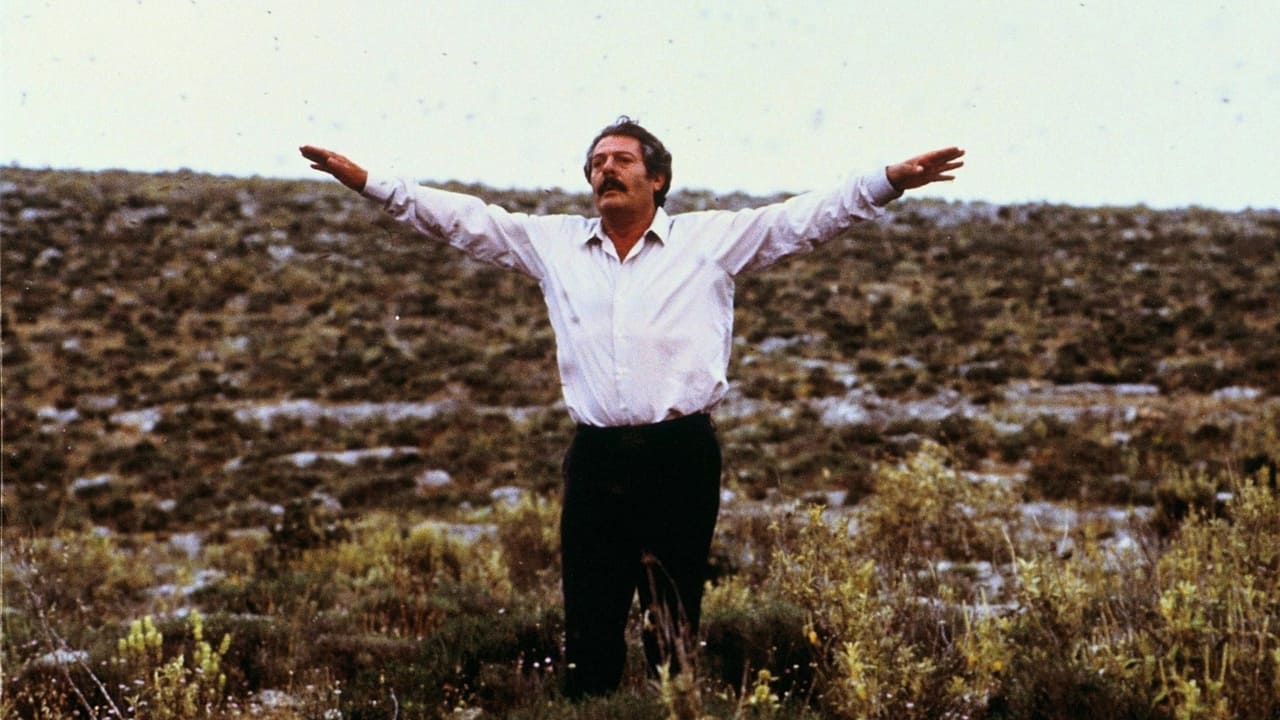Exoticalot
People are voting emotionally.
Arianna Moses
Let me be very fair here, this is not the best movie in my opinion. But, this movie is fun, it has purpose and is very enjoyable to watch.
Erica Derrick
By the time the dramatic fireworks start popping off, each one feels earned.
Cheryl
A clunky actioner with a handful of cool moments.
l_rawjalaurence
THE BEDEKEPER (L'APICULTEUR) has a straightforward plot involving the odyssey of a former schoolteacher Spyros (Marcello Mastrioanni), who embarks on a journey by lorry all over Greece and its islands to chase the honey. He ends up in his former home, now deserted, and frequents a now-deserted cinema. On the way he picks up a young girl (Nadia Mournuzi) with whom he has an on-off affair before she leaves him to embark on her travels once more.Set during the early spring, Theo Angelopoulos's film evokes a world coming to life after its winter hibernation - of showers, watery sunshine and pinkish sunsets setting over mountainous rural landscapes. Such images of future promise contrast starkly with Spyros's mental state; his beekeeping business is in decline, his wife Anna (Jenny Roussea) no longer lives with him, while he has become estranged from his daughter. It seems that he embarks on an apparently never-ending road trip because he believes he has to rather than of his own own volition.Unable to express himself except through physical acts, Spyros remains perpetually alienated from the landscape and the people inhabiting it. He visits several local communities, all of whom enjoy collective experiences of sitting outside, sipping their drinks and gossiping happily; but he can never involve himself in their lives. He remains an outsider, the object of cinematographer Giorgos Arvanitis's penetrating gaze.Despite Mastrioanni's masterly performance notable mostly for its stillness rather than action, L'APICULTEUR proves an unpleasant cinematic experience. Spyros has done something in the past to alienate himself from his family; there is a suggestion that he is a actually a pedophile. On his daughter's wedding day he gathers her up in her arms in such a way as to denote excessive affection; later on he makes love to the girl on the cinema stage by smothering her, in spite of her repeated entreaties to let her go. It's as if he cannot endure the sight of young people as they remind him of his own mortality; hence he needs to deflower them of their innocence.The cinema-image is also significant, suggesting the desire to exhibit all his seamier qualities in public. Angelopoulous intensifies that sense with a scopophilic obsession with photographing the girl in the nude, the camera lovingly tracking the contours of her body in a series of shots taken from Spyros's point of view. In the end we wonder whether she functions solely as an object of the director's and the leading character's misogyny.The mood is one of unrelenting intensity that seems particularly redolent of the mid-Eighties, a time when anti-feminism was much more of an issue in Europe than it might be today. L'APICULTEUR 's certainly an art-house film, but one whose shortcomings need to be pointed out.
a-tsitsos
This film taught me that you have to do the craziest things,leave everything behind and travel when you have the change.Then Spyros(Marcelo Mastogianni) after his daughter's wedding he leaves his job as a teacher and goes on a road trip from north to south with the thing that he cared about the most in his life his bees.Spyros is the tragic hero who finds love but he has to leave it because he couldn't hold it and his lover couldn't respond to his love.In the middle of the film we see the outburst of Spyros he wins the girl and leaves with her.The girl understands his loneliness his silence and the feeling of caring he has for her.The bees are the reason he is traveling but when he meets the girl the travel gets a different cause.So after she has abandoned him he in a final dramatic scene lets the bees to kill him giving him the end he always wanted.Marcelo Mastogianni's performance is great.Although the dialog is little in the film.Nadia Mourouzi is great too and delivers the story the best way possible.Theo Angelopoulos once again with magnificent storytelling and landscape photography gives the viewer an unforgettable experience.Sometimes you might feel a little bored though,because of the little dialog.But the short dialog isn't a disadvantage because it is the film which needs silence since the film belongs to the Trilogy of Silence.Also I have a theory on the girl.I believe that the girl is an imagination of his wife and the things the live together are memories of her.He visits his old hometown they make love on the theater,I believe that all these images are memories of how he met his wife.The film itself has a nostalgic air,so by traveling he remembers his old love.Another clue is that people from the present like his old friend(Dinos Iliopoulos) or his daughter have no contact with the girl.With the end of the journey the memory leaves,the girl leaves and he dies.I think it is possible as Theo Angelopoulos uses shots in his films often drift back and forth in time.Of course it is just a theory.Highlight of the film for me it was Spyro's unique death and the brief view of my hometown Ioannina.
FilmCriticLalitRao
It is amazing that it is only on two occasions that the great Greek director Theo Angelopoulos [1935-2012] chose to cast major film stars of international reputation in his films. In 1995, he directed "Ulysses' Gaze" with one of American cinema's greatest actors Harvey Keitel. The Beekeeper/O Melissokomos was his first film with a major star,Italian actor Marcello Mastroianni who is known to all those who appreciate great cinema. It is interesting to note that in both these films, Theo Angelopoulos has extracted unglamorous performances from these two actors who are known to ordinary cinema audiences as mere 'film stars'. The decision to cast Marcello Mastroianni must be viewed as an artistic challenge for Angelopoulos as he was already a middle aged man when he was paired against a young girl in a film about hopelessness, uselessness wherein one comes to realize the futility of one's drab existence. Through his film about a man and his passion for bees, Theo Angelopoulos teaches us that happiness is fleeting. One learns the most crucial lesson in life that even though bees are sweet for honey their bite is extremely dangerous. This is precisely the lesson which the film's protagonist experiences after a series of minor incidents which happen in his life when he travels across Greece in the company of a young girl. The notion of "So near yet so far" appears to be this film's leitmotif as even though the protagonist stands near his wife for a photo shoot, discontent is always visible on their faces. This notion makes its second appearance when the protagonist meets a young girl who is hitch hiking across Greece. Lastly, no film director has attempted to show the love felt by a young girl for an old man in an extremely personal manner as depicted by Angelopoulos in "The Beekeeper" as mutual respect is the key element in this film.One could also state that the young girl allowed herself to be treated well by the old man. This is the reason why the young girl feels that the old man is the only person who has treated her well.
norman-42-843758
This film didn't really work for me. After reading the, mostly, wonderful accolades above I was expecting better things from this movie but finished up being disappointed. It wasn't the inactivity either. I like Bella Tarr films so I am used to long takes with not very much happening. Another reviewer of a Tarr film recently noted that you could write a masters thesis on what is not going on, in between the bits of dialog. Okay, this is kind of cutesy but I know what he meant. There is a tension or at least a relationship between the characters and sometimes a "drama of the moment" in the "what will happen next", sense. With the Spyros character there was the feeling that during his moments of stoic inactivity (of which there was a lot), there was nothing going on inside. It was just a complete blank-out, no drama; no tension from silent inner feelings directed towards another, just nothing. The same scene could have been shot to equal effect without him being there. I was waiting for someone to come up to him and shout "Hello in there", in Greek of course or to give him a much needed kick in the seat of his pants. Whilst I am on the subject of pants, I would have reckoned that someone with a grown up son and two grown up daughters would have at least known that you have to open them in order to have sex. Any spotty teenager on his maiden voyage would not have acted in such an inept way. All the incidents except one in this film happened to Spyro not because of him. That one was when he drove his wagon through the front of a restaurant in order to get the girl and that came over as more of a student prank than an act of desperation.But, hey, I hear you say, this is a film that deals with the problems of loneliness and isolation and I should be more sympathetic to his situation. I understand this point of view however it is difficult to empathize with someone who has turned his back on a wife that obviously still had feelings for him; a family he could draw round him but who are now indifferent to him and friends throughout the country who he leaves at the first opportunity. Even the girl, who was selfish, never really did anything bad towards him. Spyro had no warmth within him and never did anything to gain respect. In the end even his beloved bees turned against him.In my opinion the high ranking Artificial Eye distributor has scored an own goal with this one but the enthusiasm of others will probably vindicate them.

